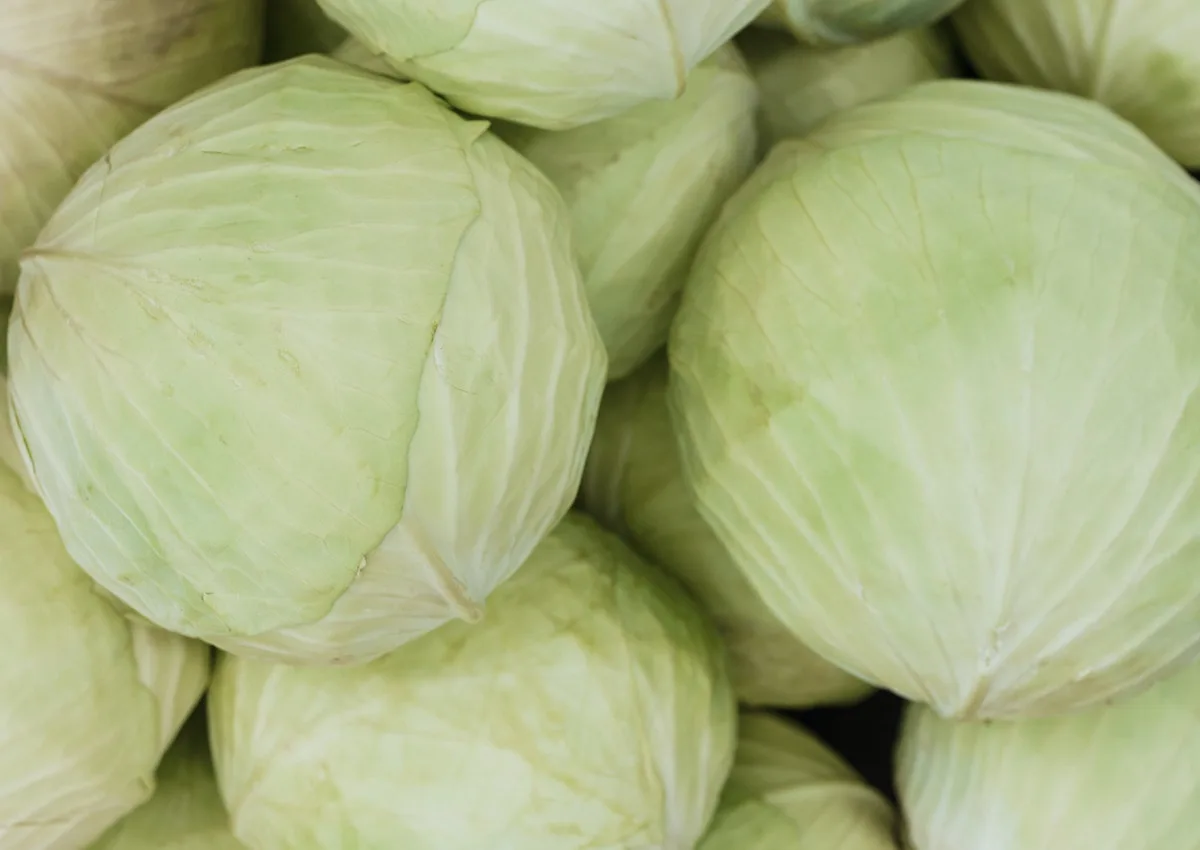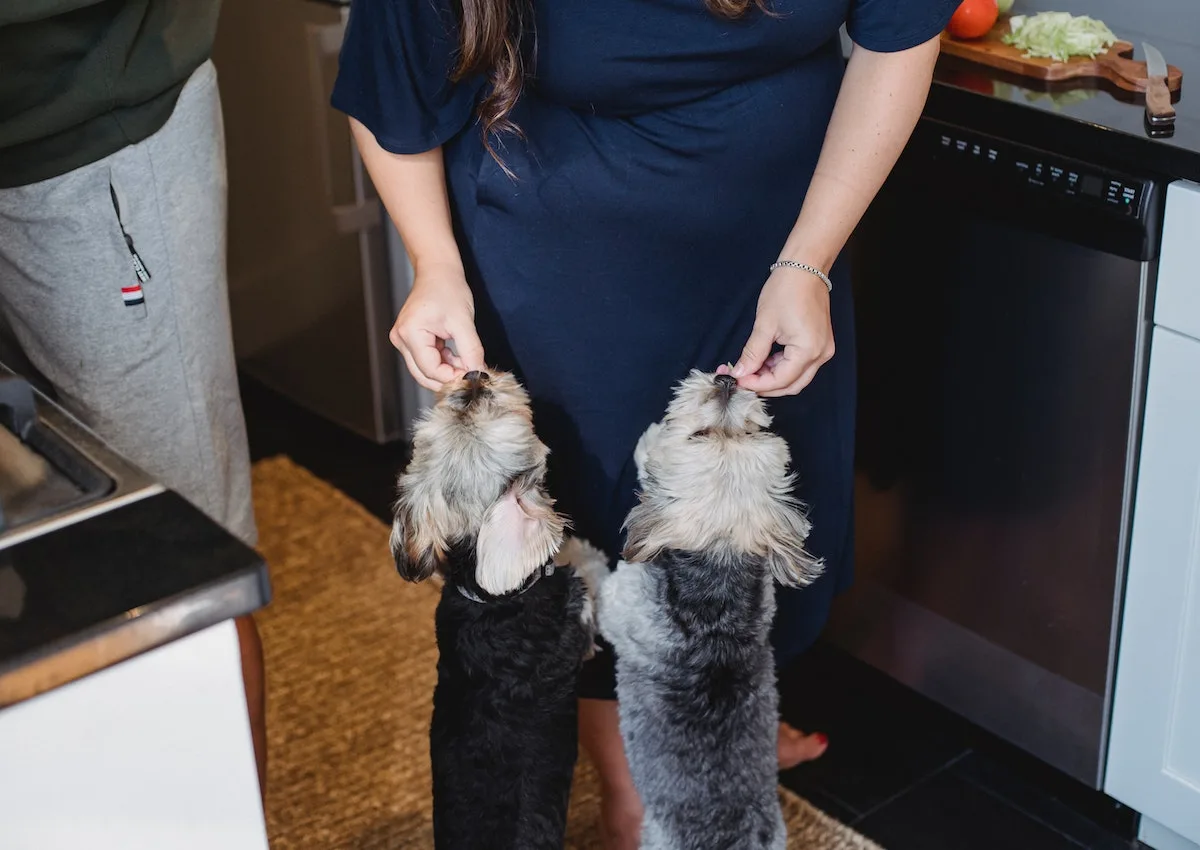Cabbage is a popular vegetable used in all sorts of cuisines and enjoyed widely by people across the world. You may be wondering “can dogs eat cabbage?” and we’ll dive into all the details answering that question in this article.

Is cabbage good for dogs?
As a cruciferous vegetable in the same family as Brussels sprouts and cauliflower which we know are safe for dogs eat if prepared properly and given in moderation, cabbage is also a vegetable that can provide certain health benefits to dogs.
Cabbage is packed with a variety of nutrients including vitamin K, vitamin C and fiber.
The polyphenols in cabbage are powerful antioxidants that help protect against the damage caused by free radicals. These antioxidants can help reduce inflammation in both humans and dogs and have been shown to help prevent cancer.
We all know the important role fiber plays in a healthy digestive system. The fiber found in cabbage is no different and can help boost your dog’s digestion.
Most high-quality commercially available dog food contains a blend of protein and vegetables. Cabbage is certainly among one of the healthy options to include in a dog’s diet when combined in an appropriate percentage of the overall food intake.
Vegetables should never replace meat protein in a dog’s diet.
Precautions to take when feeding cabbage to dogs
While cabbage and even fermented cabbage such as sauerkraut are an overall healthy addition to a dog’s diet, there are some potential downsides to be aware of.
- Gastrointestinal upset — Because cabbage is high in dietary fiber if you feed too much of it to your dog, tummy issues can result. Excessive flatulence, watery stools and stomach upset are possible with the ingestion of too much cabbage. Dogs are like people and each has its own digestive system. If you know your dog is prone to stomach issues, cabbage may not be the best food choice for your pup.
- Hypothyroidism — While somewhat rare from ingesting cabbage, a compound called thiocyanate in the vegetable can contribute to an under functioning thyroid in dogs. This typically only occurs in dogs with pre-existing thyroid issues and consistent over-feeding of cabbage, which is unlikely.

What kind of cabbage can my dog eat?
There are many types of cabbage including green cabbage, red (purple) cabbage, savoy, Napa and even bok choy. All varieties are safe for dogs to consume.
If you’re looking for the most nutritious of the bunch, opt for red cabbage. Red cabbage contains more than four times the antioxidants of green cabbage. Making red cabbage sauerkraut is one of the healthiest ways for both humans and dogs to support their gut health and enjoy this cruciferous vegetable.
Can dogs eat raw cabbage?
While raw cabbage is safe for dogs to eat, it can be harder on their digestive system. Boiled or roasted cabbage leaves will be gentler on their guts and likely more enjoyable for your pup.
Be sure to avoid cooking cabbage with with onions or garlic which are both toxic to dogs and limit the use of any spices. When feeding your dog human food such as cabbage, it’s best to keep the preparation plain and simple.
Depending on the size of your dog, it may be a good idea to chop up the cabbage leaves once cooked to avoid any potential choking hazards. Cabbage leaves can be quite large and rubbery making it easy for smaller breeds to choke on.

How to prepare cabbage for your dog
If possible, buy organic cabbage. This minimizes the exposure to toxic chemicals found in herbicides and pesticides that can be detrimental to your dog’s health.
Peel the outer leaves off and wash the cabbage under cold running water. Chop or dice the cabbage into appropriately sized pieces for your dog and either steam, roast or boil under soft.
The cooked cabbage can be added to your dog’s food or given as a snack. Always be sure to limit additional foods and treats to less than 10% of your dog’s overall food intake.
Watch for any adverse reactions the first time you give your dog cabbage. It’s best to isolate the cabbage from any other foods. In case there’s a reaction, you can then be sure of the culprit.

